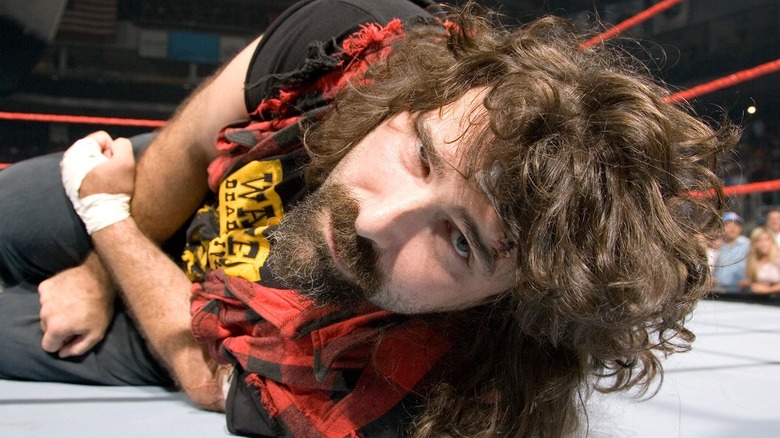Why Eric Bischoff Says Mick Foley Was 'A Liability' In WCW
Fans who followed Mick Foley's first WCW stint would know that his gimmick was to pair up with enhancement talents, lose matches, and then attack his partner out of frustration afterward — notably with his signature elbow drop onto the concrete floor. After leaving WCW for about a year, he'd return for feuds with Sting among others, before settling into his iconic rivalry with Big Van Vader. During their rivalry, Cactus Jack pushed the envelope to the point where WCW refused to put his matches on pay-per-view, and then-WCW President Eric Bischoff denied Foley's request to work a storyline surrounding him losing his ear.
Those creative differences led to WCW and Foley parting ways in 1994. On his "83 Weeks" podcast, Bischoff explained why Foley didn't continue with WCW.
"I let Mick go, because Mick was dangerous," Bischoff said. "Mick was intent on wrestling this extreme, high-risk wrestling style — jumping off balconies and things like that. That was the last straw, and I let Mick go because Mick was a liability — not only onto himself but — in certain circumstances in WCW — he was dangerous to the fans. Not intentionally, obviously, but when you're jumping off balconies onto the floor in front of the crowd, things can go wrong."
Bischoff revealed his bosses at Turner made it clear that Foley's antics would not be tolerated and that they "had to be mindful of litigation" — from both talents and fans. This led to Bischoff asking Foley to tone down his style but to no avail. "Mick made his own decision to leave WCW. He was given a choice, and he chose to continue wrestling the way he wrestled."
Foley's WCW exit paved the way for his two-year stint in ECW, which served as the launching pad for his illustrious WWE career.
If you use any of the quotes in this article, please credit "83 Weeks" with an h/t to Wrestling Inc. for the transcription.
